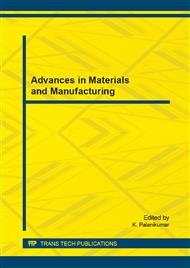p.635
p.643
p.649
p.655
p.661
p.668
p.674
p.681
p.687
Effect of Process Parameters on Wear Performance in Abrasive Flow Machining
Abstract:
The wear performance of the mild steel under different Abrasive Flow Machining (AFM) conditions was studied. Wear properties of mild steel are considerably affected by the process parameters of AFM.The effect of extrusion pressure, abrasive concentration and abrasive size during AFM on wear performance were investigated using a reciprocating wear testing machine. Experiments were conducted according to 23 factorial design of experiments for this purpose. The contribution of the process parameters on wear resistance were obtained performing Analysis of Variance (ANOVA). The wear rate, specific wear coefficient (Ks), wear resistance, fatigue strength and surface hardness are also considerably affected by the process parameters abrasive concentration, extrusion pressure and abrasive size.
Info:
Periodical:
Pages:
661-667
Citation:
Online since:
June 2015
Authors:
Price:
Сopyright:
© 2015 Trans Tech Publications Ltd. All Rights Reserved
Share:
Citation:


